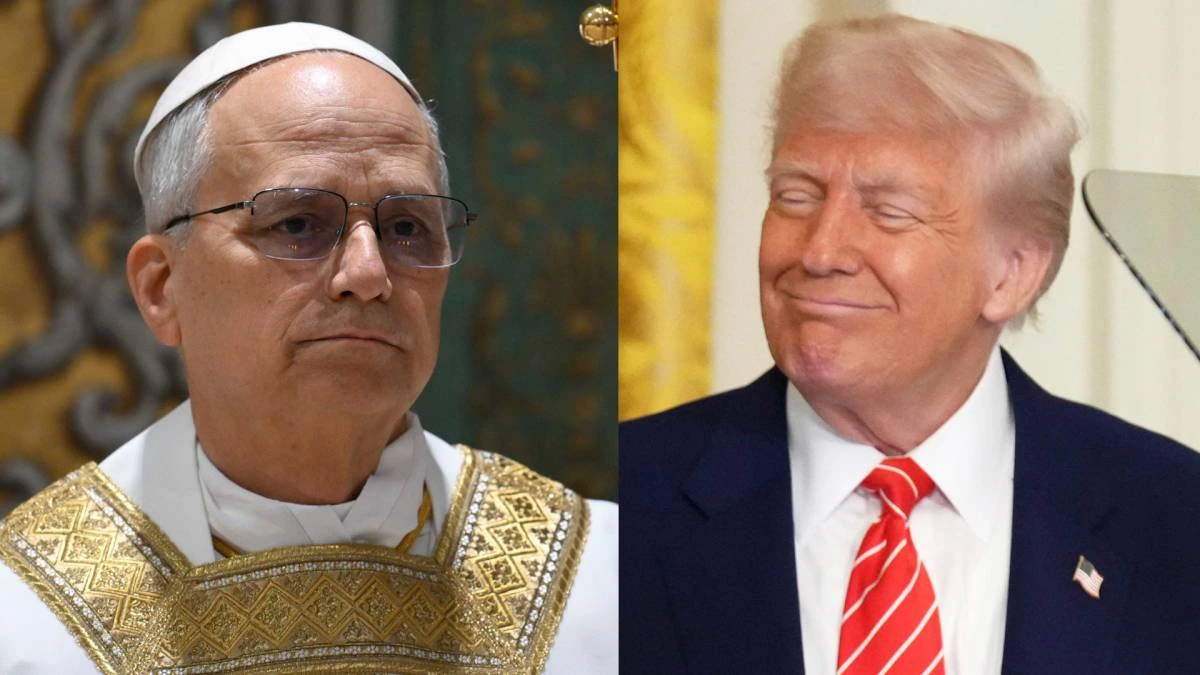VATICAN CITY — Pope Leo’s early goodwill with conservative Catholics appears to be fading after the pontiff criticized US President Donald Trump’s immigration policies, questioning whether they align with the Church’s pro life doctrine.
The remarks, delivered Tuesday during a press briefing with Vatican correspondents, drew sharp responses from American conservatives who had initially embraced Leo for his traditional approach and cautious stance on divisive social issues.
Someone who says I am against abortion but I am in agreement with the inhuman treatment of immigrants in the United States, I don’t know if that’s pro life, Pope Leo said, challenging the moral consistency of Trump’s policies.
Elected in May as the first US pope, Leo initially garnered praise from conservative factions within the Catholic Church for reviving traditional liturgies and refraining from commentary on hot button issues.
His approach was seen as a departure from his predecessor, Pope Francis, whose progressive positions on climate change, migration, and social justice often drew conservative criticism.
The honeymoon, however, was disrupted after Leo’s latest remarks on immigration, which many conservative Catholics view as a political intrusion.
Former Texas Bishop Joseph Strickland, known for his vocal defense of traditional values, said the pope’s comments created “much confusion regarding the sanctity of human life and the moral clarity of the Church’s teaching.”
The Trump administration, which clashed frequently with Francis, was quick to respond. White House Press Secretary Karoline Leavitt rejected the characterization of “inhumane treatment” of immigrants, defending the administration’s border enforcement policies as necessary for national security.
Religious analysts say Pope Leo’s remarks mark a significant test of his leadership as he seeks to unify a polarized global Church.
Pope Leo has a deep commitment to Catholic social teaching, which includes both the defense of life and the dignity of migrants, said Dr. Angela Romano, a Vatican scholar at Georgetown University.
His comments suggest he’s not willing to separate these values, even if it means alienating some conservatives. Elise Allen, author of Leo, The American Pope, said the pontiff’s statements were consistent with his pastoral background in Latin America and his long standing advocacy for immigrant communities.
They shouldn’t be surprised, Allen said. “He’s cautious by nature, but he won’t shy away from what he believes is the Gospel truth.”
Cardinal Michael Czerny, a senior Vatican adviser, cited scripture in defense of Leo’s position. “He is following the guidance of St. Paul: ‘Preach the word, be urgent in season and out of season,’” Czerny said.
Immigration has long been a defining issue in US politics and a focal point of papal diplomacy. Under the Trump administration, policies such as family separation and reduced refugee admissions drew criticism from Catholic bishops and humanitarian organizations.
A 2024 Pew Research Center survey found that 58 percent of US Catholics viewed Trump’s immigration stance as “too harsh,” while 31 percent approved of his approach. Among conservative Catholics, approval rose to 54 percent, indicating a split within the faithful.
The Vatican, historically an advocate for migrants, has repeatedly urged nations to adopt humane policies that protect human dignity. Pope Francis made migration a cornerstone of his papacy, and early indications suggest Leo intends to maintain that emphasis.
Among American Catholics, reactions to Leo’s remarks were mixed. “I respect the Holy Father, but I wish he’d stay out of politics,” said John Patterson, a parishioner in Houston. “Trump has done more for pro life causes than any president in decades.”
Others welcomed the pope’s challenge. “Being pro life means caring for all life, not just unborn babies,” said Maria Hernandez, an immigration advocate in Los Angeles. “Leo is reminding us that compassion doesn’t stop at the border.”
Father Thomas Keller, a priest in Philadelphia, said the controversy highlights a broader tension in Catholic identity. “Many US Catholics are struggling to reconcile their political loyalties with the Church’s moral teachings,” Keller said. “Pope Leo’s statement forces an uncomfortable but necessary conversation.”
Vatican insiders say Leo is unlikely to retreat from his position despite conservative pushback. The pope’s pastoral agenda, outlined in his inaugural Mass, emphasizes unity, mercy, and a consistent ethic of life principles that encompass both opposition to abortion and advocacy for migrants.
Still, analysts warn that repeated clashes with American conservatives could weaken his influence among one of the Church’s largest national contingents. “He’ll have to navigate carefully,” said Romano. “But his focus appears to be on moral clarity, not political consensus.”
The episode may also foreshadow a recalibration in Vatican US relations, particularly as the 2026 midterm elections reignite debates over border policy and national identity.
Pope Leo’s critique of President Trump’s immigration policies underscores a defining challenge of his papacy balancing a call for unity with a commitment to uncompromising moral principles.
While his comments have strained relations with some conservative supporters, they reaffirm the Vatican’s longstanding position that pro life values extend beyond opposition to abortion.
MyAs Leo charts his course as the first American pope, his willingness to speak on contentious issues signals a pontificate unafraid of ruffling feathers in pursuit of conscience.
